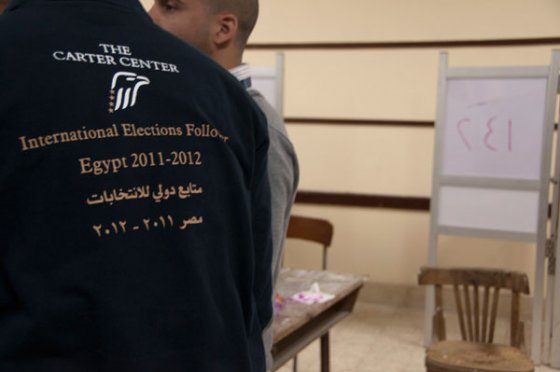
The Ministry of Social Affairs denied the requests of eight American NGOs seeking permission to operate in Egypt. One of the NGOs is the Carter Center, which was seeking to deploy observers to monitor the presidential election.
PROTESTS:
1) Following mass demonstrations on April 20 in Tahrir Square, Field Marshal Tantawi renewed the SCAF’s assurances that power will be transferred to an elected civilian president chosen by the people, saying, “We are not politicians.” [al-Ahram, English, 4/23/2012] [al-Masry al-Youm, Arabic, 4/23/2012]
ELECTIONS:
2) The Supreme Presidential Electoral Commission (SPEC) announced on April 22 that Egyptian civil society organizations registered with the Ministry of Social Solidarity will be allowed to monitor the upcoming presidential election, while the potential role of foreign observers is still under discussion. The presidential election is scheduled to take place on May 23 and 24, and the president will be named on 21 June after a runoff voting round on June 16-17. [al-Ahram, English, 4/23/2012]
CONSTITUTION:
6) General Sami Anan, deputy leader of the SCAF, met with legal experts on April 21 to discuss the second attempt at forming a constituent assembly. The group reached a non-binding agreement that the 100-member constituent assembly should be elected by the people rather than parliament. The original constituent assembly (containing 50 MPs) was disbanded following an administrative court ruling on April 10. The group also discussed the possibility of temporarily reinstating the 1971 constitution until a new constitution is written. [al-Ahram, English, 4/23/2012]
CIVIL SOCIETY:
8) The Ministry of Social Affairs denied the requests of eight American NGOs seeking permission to operate in Egypt. One of the NGOs is the Carter Center, which was seeking to deploy observers to monitor the presidential election. [al-Masry al-Youm, English, 4/23/2012]
SECURITY:
9) Egypt’s interim government has canceled the national cup competition, ending all soccer in the country this season. League games were called off last month after 74 people were killed in fan clashes at a stadium in Port Said. [AP, English, 4/23/2012]
EGYPT-ISRAEL RELATIONS:
10) Israel Foreign Minister Avigdor Lieberman says Cairo’s decision to terminate the gas deal should be understood as trade dispute rather than a diplomatic one. The Egyptian company EGAS confirmed on April 23 the termination of the 20-year-old contract, under which Egypt supplied 40 per cent of Israel’s natural gas. Knesset opposition leader Shaul Mofaz said the move calls for an “immediate American response” and Finance Minister Yoval Steinitz said the decision could have serious political and economic implications for the Camp David Accords. The gas pipeline carrying gas from Egypt to Israel and Jordan has been sabotaged 14 times since the resignation of former President Hosni Mubarak. [YNet, English, 4/23/2012] [al-Ahram, English, 4/23/2012] [al-Ahram, English, 4/23/2012]
Photo Credit: Carter Center
Image: egypt2012-0837.jpg
